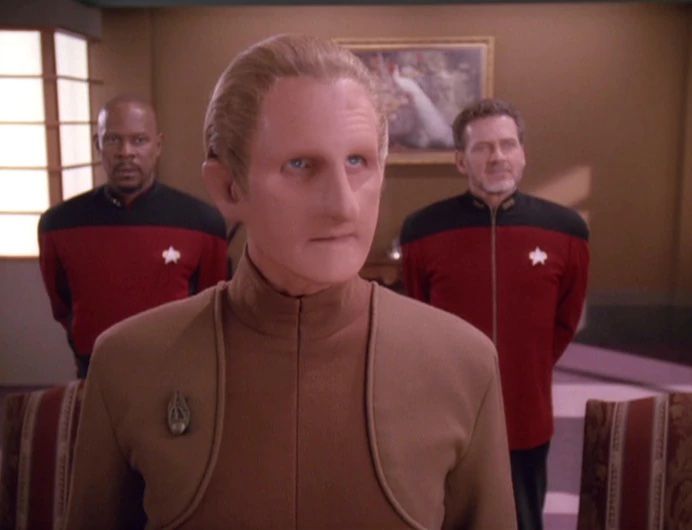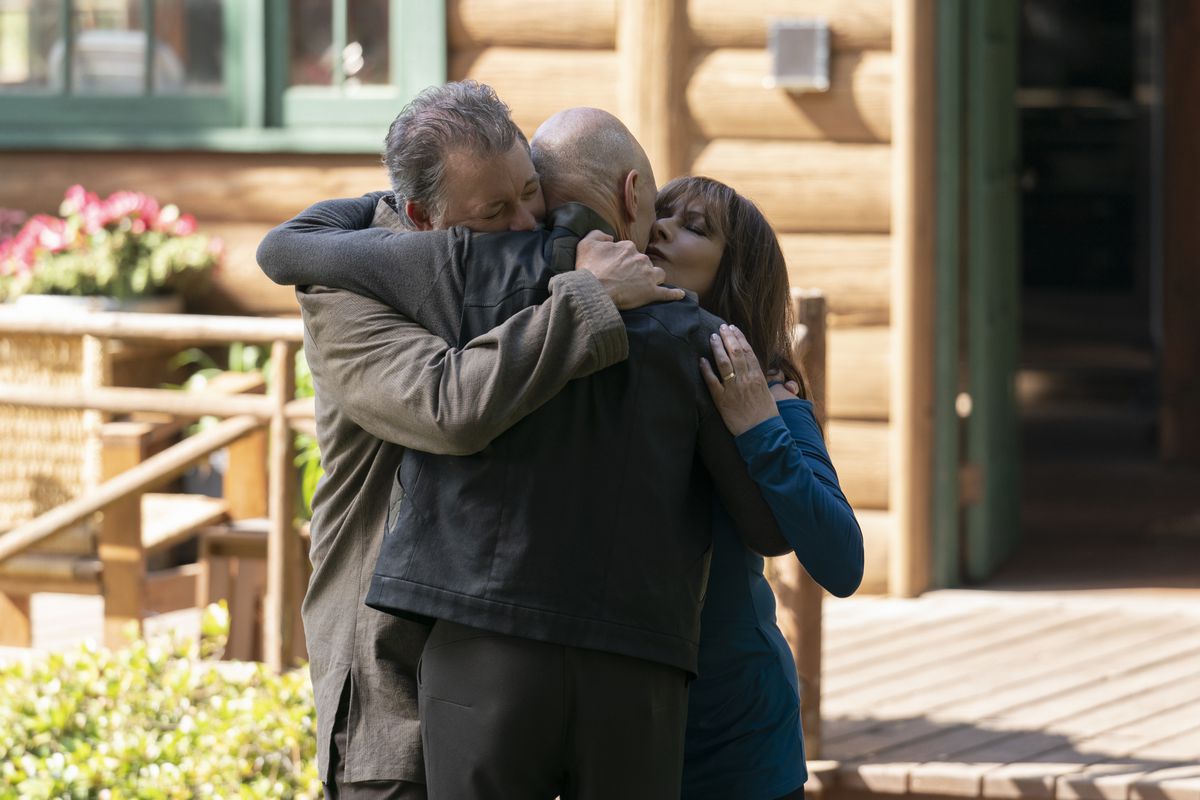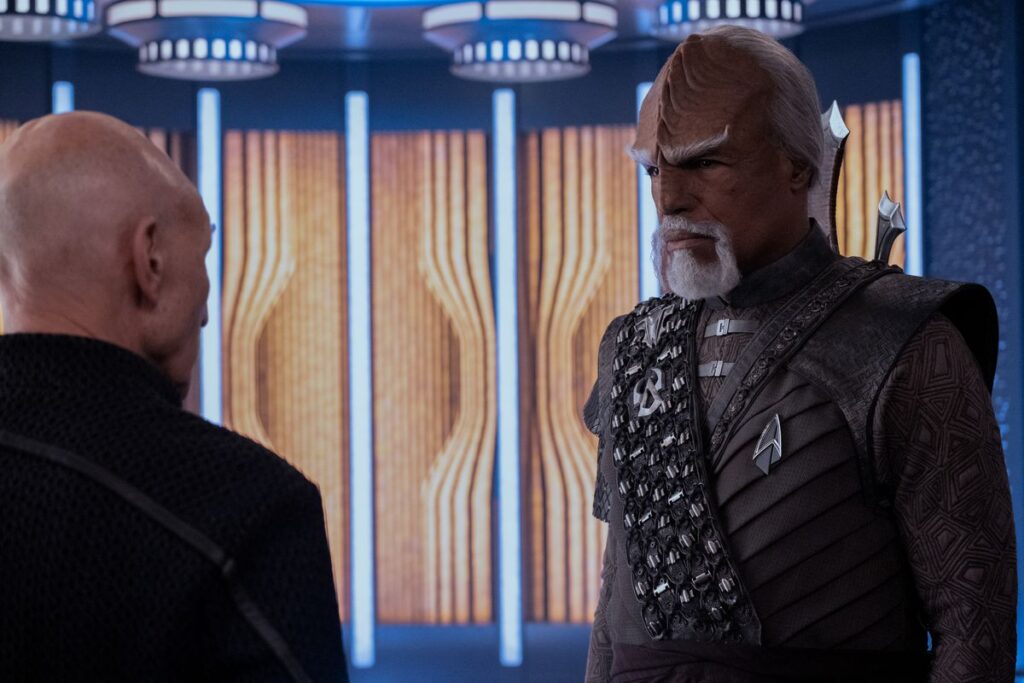It’s hard to imagine anyone arguing against Star Trek: Picard as pitched. Patrick Stewart is inarguably the most famous actor to play a Star Trek lead, and his status as a cinematic pater familias to multiple generations is unwavering. Jean-Luc Picard is the patron saint of Star Trek, his flaws of the minor sort that only serve to make space heroes cooler space heroes: masculine isolation, trauma from that badass adventure, not liking kids. Absolutely, let’s make a show about that guy!
But after two seasons of Picard, the shine is decidedly off. Picard has followed a pattern of starting strong and fizzling explosively to nothing by story’s close so closely that it’s made an obvious final-season concept — Next Generation cast reunion! — feel like a last ditch attempt to be remembered fondly.
And yet… with this season’s third episode, “Seventeen Seconds,” Picard tips its hand about the series’ future. Picard season 3 isn’t just about remembering Admiral Jean-Luc Picard, it’s about remembering all of 1990s Trek, and it just might be the show’s saving grace.
[Ed. note: This piece contains spoilers for Picard season 3 episode 3, “Seventeen Seconds.”]
Photo: Trae Patton/Paramount Plus
From its first season, Picard has played with elements of 1995’s Star Trek: Voyager, namely Jeri Ryan’s former Borg drone Seven of Nine; famously the only other known person to survive assimilation into the Borg collective. It was a connection Star Trek fans had speculated about for decades.
And with “Seventeen Seconds,” Picard brought back the Klingon officer Worf. Worf, after all, had a significant life as a character beyond The Next Generation, becoming more central to Star Trek canon in Star Trek: Deep Space Nine than he ever was on TNG: a major player in the Federation’s war against the forces of the Founders, and a step away from becoming undisputed ruler of the Klingon empire.
When Worf and his Starfleet intelligence officer Raffi interrogate a prisoner responsible for a recent explosion in episode 3 of Picard season 3, the prisoner becomes increasingly agitated, in mind and physiology. Raffi assumes he is in withdrawal from drug addiction, but Worf, instead, calmly asks him when he last communed with the Great Link. A moment later he casually refers to Odo, the shapeshifting constable of Federation space station Deep Space 9.
Reader, I admit I gasped. Picard’s big bads seem to be the same villains of 1993’s Star Trek: Deep Space Nine: The shapeshifting Founders, or Changelings, who were all intertwined with the Dominion War.
Only ’90s kids remember

Image: Paramount
This move will be a particular kind of catnip for fans of the at-the-time experimental and least beloved Trek series, which today — with its long-term character development and season-long story arcs — is regarded as an early harbinger of the era of prestige television. DS9 is still, unfortunately, groundbreaking in the way it centered a Black family (multiple Black families, if you count Worf’s whole deal) in sci-fi TV.
But by bringing the full trinity of ’90s Trek together in one show, Picard also highlights a radical sea change for the franchise. While Next Generation lived on past its finale through theatrical films, the stories and characters of Voyager and Deep Space 9 were left fallow.
For two decades, the Star Trek franchise’s attempts to maintain cultural relevance have, paradoxically, been concerned with reviving the oldest of its parts — and not just in the Abrams/Kelvin film franchise, which in 2009 attempted to retell the greatest hits of a TV series from 1966. The settings of both 2001’s Star Trek: Enterprise and 2017’s Star Trek: Discovery (at least initially) shot back in time to an era when Vulcans were exotic and Klingons our mortal enemies.
But today, only Star Trek: Strange New Worlds, a deliberate throwback in format and setting but vitally not theme, stakes its claim in the Original Series era. Discovery flung itself forward in time to the bleeding edge of continuity two seasons ago, while Lower Decks and Prodigy are locked solidly in post-TNG/VOY/DS9 territory. With Picard, that era is not merely being referenced, but fully continued.
No kings, no lords, no captains

Photo: Aaron Epstein/CBS
This expansion, from a love letter to Jean-Luc Picard to a love letter to all of ’90s Trek, highlights what made the show so promising and disappointing in its first two seasons. Picard feinted towards an ensemble, but never fully committed. It was, definitionally, the Picard Show, and it never managed to make its cast even half as compelling as the Next Generation bridge.
Much is made of how the captains of Star Trek define their respective shows — but the ensemble equally makes or breaks the franchise. On the venn diagram of “Trek movies that are really just about the captain” and “Trek movies everybody kinda wants to forget,” you will find pretty significant overlap. The more Picard fronted Jean-Luc’s story over his cast members, the more it floundered. And from the way virtually all the show’s original characters were summarily jettisoned at the end of season 2 to make room for the classic crew of the Enterprise, it seems that the show realized a simple fact: We fell in love with Captain Jean-Luc Picard, patriarch of the Enterprise D’s officers, not Admiral Jean-Luc Picard in his aging isolation.
The captain is how Star Trek hooks you, it’s not how it gets you to stay. As Jean-Luc would be the first to say, a captain is only as good as his crew. And with “Seventeen Seconds,” Picard may have finally figured out not just that the myth of Jean-Luc Picard was the captain with his crew, not surpassing them — but also that the ways that crew surpassed The Next Generation are not a distraction from his legend, but a vital part of it.

